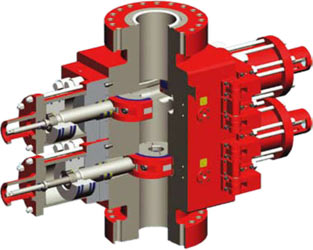Well Control Equipment – BOP Control System
1) The following statements relate to the driller’s remote control BOP control panel located on the rig floor. Decide if the statements are true or false.
a) If you operate a function without operating the master control valve that function will not work.
b) The master control valve on an air operated panel allows air pressure to go to each function in preparation for you operating the function.
c) The master control valve must be held depressed while BOP functions are operated.
d) The master control valve must be depressed for five seconds then released before operating a BOP function.
Answer:
a) True
b) True
c) True
d) False
2) The API RP53 states that closing time should not exceed X seconds for annular BOPs smaller than 18-3/4″. What is the value of X?
a) 30 sec.
b) 60 sec.
c) 2 min.
d) 45 sec.
Answer: d
3) Which is the correct definition of the HPU reservoir volume according to API RP53?
a) 2 times usable accumulator volume.
b) 2 times accumulator volume.
c) 5 times total accumulator volume .
Answer: a
a) Manifold pressure.
b) Annular pressure.
c) Accumulator pressure.
d) Precharge pressure.
Answer: a & c
5) When closing the annular preventer from the remote panel, which two gauges show a reduction in pressure?
a) Manifold pressure.
b) Annular pressure.
c) Accumulator pressure.
d) Air pressure.
e) Bypass pressure.
Answer: b & c
6) A BOP operating unit has 8 accumulator bottles, each with a capacity of 10 gallons.
Operating pressure is 3000 psi. Precharge pressure is 1000 psi.
What is the total usable fluid volume when the minimum BOP operating pressure is 1,200 psi?
Answer: 40
7) On a 3000 psi accumulator system, what are the normal operating pressures seen on the following gauges on the drillers remote control panel?
(i) Air pressure.
(ii) Accumulator pressure.
(iii) Manifold pressure.
(iv) Annular pressure.
Answer:
(i) Air pressure = 120 psi
(ii) Accumulator pressure = 3000 psi
(iii) Manifold pressure = 1500 psi
(iv) Annular pressure = 750 – 1500 psi
8) On which two gauges on the remote panel would you expect to see reduction in pressure when the annular preventer is being closed?
Answer: 2 & 4
Read Also Oil Well Drilling Problems
9) If the air pressure on the drillers panel reads 0 psi, which of the following statements is true?
a) No stack function can be operated from the remote panel.
b) All stack function can be operated from the remote panel.
c) Choke and kill lines can still be operated from the remote panel.
d) The annular preventer can still be operated from the remote panel.
Answer: a
10) Which of the problems below would not stop the BOP from closing?
a) Master control valve was not held down.
b) Four-way valve did not shift position.
c) Closing line in the BOP was blocked.
d) Leak in the hydraulic line to the BOP or in the BOP closing chamber.
e) Air pressure to the panel was lost.
f) A bulb has blown on the remote panel.
Answer: a
11) When drilling, which may be the correct position of the 4-way valves on the BOP accumulator unit?
a) open
b) close
c) neutral
d) open or closed depending on BOP stack function
Answer: d
12) What is the normal precharge for the accumulator bottles on a 3000 psi accumulator unit?
a) 1000 psi
b) 3000 psi
c) 1200 psi
d) 200 psi
Answer: a
13) Name three indications that a function operated normally.
Answer:
a. light changes color.
b. read back pressure drops & read back pressure recovers.
c. flow meter stops at a proper reading.
14) A driller needs to close in a flowing well with drill pipe in a subsea BOP stack. He pushes the “Annular Close” button and the pilot light changes, but all gauges and the flowmeter remain static. What is his best option?
a) Change pod and try again.
b) Call and wait for the subsea engineer.
c) Send assistant driller to manually operate the 4-ways valve on the Hydraulic Control Manifold to close the annular.
d) Close the lower annular preventer.
Answer: a
15) While drilling, an alarm goes off indicating low accumulator pressure and the flow meter indicates a rapid loss of fluid. The best course of action is:
a) Stop drilling and shut the well in.
b) Stop drilling and call subsea engineer.
c) Stop drilling and put all function in block one at a time until the flow stops.
d) None of the above.
Answer: c
Read Also Drilling Rotating Equipment
16) When a function is operated, which of the following is true?
a) SPM valve will operate in both pods.
b) SPM valve will operate only on the active pod.
c) The SPM valve will operate after the function is complete.
Answer: a
17) How much time is allowed for ram type preventers to close in API RP53?
Answer: The BOP control system should be capable of closing each ram BOP in 45 seconds or less.
API RP53 3rd edition March 1997 (13.3.5, p.31)
18) Name two items on the stack that are supplied by fluid from the manifold regulator.
Answer: pipe rams, connectors, failsafe valves, shear rams.
19) From which position in the hydraulic circuit is readback pressure taken?
a) Upstream of the regulator in the pod?
b) The regulator itself?
c) Down stream of the regulator in the pod?
Answer:
(b) The connection is to the regulator, the measurement is taken on the downstream (regulated) side.
20) What is the principal reason for fitting ram locking devices such as wedgelocks or poslocks to a subsea stack?
a) To give additional force when closing in, thus reducing delay times.
b) To lock the ram in the closed position and maintain the shear rams locked during disconnect.
c) To lock the BOP stack to the well head and lock the lower Marine Riser Package to the BOP stack.
Answer: b
21) The subsea hydraulic BOP control system is divided into a Control System and a Pilot system. Which two statements are true with respect to the Pilot System?
a) The fluid in the Pilot System flows continuously while a function on the BOP takes place.
b) The Pilot System dumps fluid to the sea at every operation of BOP functions.
c) The Pilot System controls the position of all shuttle valves on the BOP stack directly.
d) The Pilot system is a closed dead-end system.
e) Pilot fluid consists of potable water, water soluble concentrate and glycol.
Answer: d & e
22) Which two statements are true with respect to shuttle valves on a subsea stack?
a) The shuttle valves automatically seal any hydraulic leaks in the selected pod.
b) The shuttle valves prevent communication between the selected system and the redundant system.
c) The shuttle valves are pilot operated.
d) The shuttle valves allow the retrieval of a malfunctioning pod without losing hydraulic BOP control.
Answer: b & d
23) What is the purpose of the “Memory Function” on electric control panels?
a) Memory Function indicates a malfunction by giving permanent light on the alarm panel after an alarm has been acknowledged and the audible alarm has stopped.
b) Memory Function reminds the driller to add anti-freeze fluid when the temperature drops below a set level.
c) Memory Function indicates the previous position before “Block position” of three position functions.
d) Memory Function reminds the driller to engage Wedge Locks before hanging off.
Answer: c
24) Mark the following statements true or false regarding to the use of “manipulator” type 4- ways valve used in subsea hydraulic BOP control systems.
a) If the valve is shifted to the center or “block” position, pressure will be vented from the line previously pressurized.
b) The center or “block” position can be used for troubleshooting hydraulic leaks.
c) The “pod selector” valve on a subsea hydraulic BOP control system is of the manipulator type.
d) If the valve is shifted to the center or “block” position, pressure will be trapped in the line previously pressurized.
e) Manipulator type valves are the types typically installed inside the pod hose
Answer:
a) True.
b) True.
c) True.
d) False.
e) False.
25) Mark the statements below “true” or “false” when drilling with a float valve in the string.
a) Surge pressure.is reduced.
b) Reverse circulation is possible.
c) Flowback through the drillstring often occurs after pumping a slug.
d) Shut-in drillpipe pressure can be taken without starting the pumps.
Answer:
a) False.
b) False.
c) True.
d) False.
26) What is the primary function of the choke in the overall BOP system?
a) To divert contaminant to burning pit.
b) To hold back pressure while circulating up kick.
c) To divert fluid to the mud tank.
d) To prevent the loss of mud due to expansion of gas.
e) To close the well in softly.
Answer: b
27) What is the reason for installing a riser fill-up valve in the marine riser of a subsea operation?
a) To relieve the diverter system on the rig when diverting a shallow gas kick.
b) To prevent collapse of the marine riser in an emergency.
c) To increase buoyancy on the marine riser in order to relieve the riser tensioning system on the rig.
d) To save time filling the hole when tripping out.
Answer: b
28) Identify the situations in which a BOP pressure test is required per API RP-53
a) After circulating out a gas kick.
b) Prior to drilling into a known high pressure zone.
c) After changing out BOP components or after maintenance.
d) After setting a casing string.
Answer: b, c , d
29) Which tool would you use if you wanted to test the BOP stack, the casing head and upper casing seals.
a) Plug type tester
b) Cup type tester
Answer: b
30) While testing the BOP stack, it is noticed that hydraulic oil is leaking from the weep hole on the upper rams. Which one of the following best describes the proper action to be taken?
a) Energize plastic seal and repair BOP at next scheduled maintenance.
b) A primary seal is leaking, secure the well and repair the seal.
c) The rams packer is leaking due to wear. Change the worn packer.
d) Do nothing. The seal requires a slight leak for lubrication purpose.
Answer: b
31) Why should the side outlet below a test plug be kept in the open position while testing a surface BOP stack?
a) Because of potential damage to casing/open hole.
b) Because the test will create extreme hook load.
c) Otherwise reverse circulation will be needed to release the plug
Answer: a
References:
1.Transocean Sedco Forex – Jakarta Learning Centre – Pre-school exercises for Well Control With Answers.
2. Well Control Manual part.1 & 2 – from Well Control School

